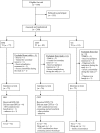Is increasing physical activity necessary to diminish fatigue during cancer treatment? Comparing cognitive behavior therapy and a brief nursing intervention with usual care in a multicenter randomized controlled trial
- PMID: 20930100
- PMCID: PMC3227893
- DOI: 10.1634/theoncologist.2010-0092
Is increasing physical activity necessary to diminish fatigue during cancer treatment? Comparing cognitive behavior therapy and a brief nursing intervention with usual care in a multicenter randomized controlled trial
Abstract
Background: Two interventions for fatigue were given during curative cancer treatment. The aim of this multicenter randomized controlled trial (RCT) with three conditions was to demonstrate the efficacy and to determine the contribution of physical activity.
Methods: Recruited from seven hospitals, 220 patients with various malignancies participated in a RCT. The brief nursing intervention (BNI) consisted of two 1-hour sessions, 3 months apart, given by 12 trained nurses, focusing only on physical activity. Cognitive behavior therapy (CBT) consisted of up to ten 1-hour sessions, within 6 months, provided by two therapists, focusing on physical activity and psychosocial elements. The control group received only usual care (UC). Assessments took place before and at least 2 months after cancer treatment, when patients had recovered from acute fatigue. Fatigue was the primary outcome. Efficacy was tested using analyses of covariance. A nonparametric bootstrap approach was used to test whether the effect on fatigue was mediated by physical activity.
Results: The CBT group was significantly less fatigued than the UC group. Between the BNI and the UC groups, no significant difference was found in fatigue. The mediation hypothesis was rejected.
Discussion: CBT given during curative cancer treatment proved to be an effective intervention to reduce fatigue at least 2 months after cancer treatment. The BNI was not effective. Contrary to what was expected, physical activity did not mediate the effect of CBT on fatigue. Thus, the reduction in fatigue elicited by CBT was realized without a lasting increase in physical activity.
Conflict of interest statement
The content of this article has been reviewed by independent peer reviewers to ensure that it is balanced, objective, and free from commercial bias. No financial relationships relevant to the content of this article have been disclosed by the authors or independent peer reviewers.
Figures
References
-
- Dagnelie PC, Pijls-Johannesma MCG, Lambin P, et al. Impact of fatigue on overall quality of life in lung and breast cancer patients selected for high-dose radiotherapy. Ann Oncol. 2007;18:940–944. - PubMed
-
- Orre IJ, Fossa SD, Murison R, et al. Chronic cancer-related fatigue in long-term survivors of testicular cancer. J Psychosom Res. 2008;64:363–371. - PubMed
-
- Servaes P, Verhagen S, Bleijenberg G. Determinants of chronic fatigue in disease-free breast cancer patients: A cross-sectional study. Ann Oncol. 2002;13:589–598. - PubMed
-
- Servaes P, Verhagen C, Bleijenberg G. Fatigue in cancer patients during and after treatment: Prevalence, correlates and interventions. Eur J Cancer. 2002;38:27–43. - PubMed
-
- Blesch KS, Paice JA, Wickham R, et al. Correlates of fatigue in people with breast or lung cancer. Oncol Nurs Forum. 1991;18:81–87. - PubMed
Publication types
MeSH terms
LinkOut - more resources
Full Text Sources
Medical


